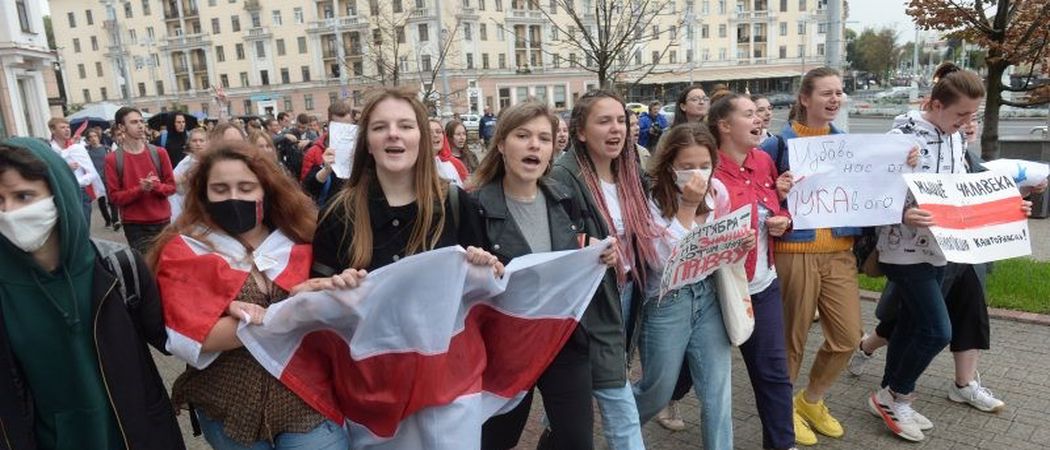
Students in Belarus during a protest. Photo: EURACTIV.
The European University Association (EUA), the European Students’ Union (ESU) and Scholars at Risk (SAR) join together to condemn the criminalisation of students and academics in Belarus. They call on the Belarusian authorities to protect and promote academic freedom and related fundamental rights and urge European governments to support at-risk scholars and students from Belarus.
On 14 May, trials began for eleven students and one professor from universities in Minsk who participated in peaceful protests in the aftermath of the 2020 presidential elections. They were arrested in November 2020 and face criminal charges for “actions that grossly violate public order”, with potential prison sentences of up to two years. They have reportedly had little or no contact with their relatives since their arrest and the press has been excluded from the trial, which is expected to continue until mid-June.
The twelve on trial are among a growing number of university members who have been detained, expelled from their institutions, and punished with exorbitant fines simply for participating in the protests last autumn.
Anastasia Bulibenka, 19 years old, was expelled from the Belarus State University, detained, and is now among those on trial. Her case is documented in a recent Amnesty International publication describing the government pressure and aggression addressed to the university teachers and students who joined protests.
As of 21 May, at least 480 students had been detained according to the Belarusian Students’ Association. They now include Sofia Sapega, a student at the European Humanities University, a Belarusian university forced to relocate to Lithuania in 2004. She was detained on 23 May with the journalist and blogger Roman Protasevich when the Belarusian government illegally diverted their plane to Minsk. The European Council called for their immediate release, and announced the prolongation of existing and new sanctions.
Concern within the European higher education community is mounting. In November 2020, SAR launched a call for action in support of students and scholars in Belarus, and EUA and ESU issued a joint statement calling on the Belarusian authorities “to refrain from suppressing peaceful protests and to guarantee all citizens, including students and university staff, the right to free expression, assembly and protest.” Unprecedented in its 20-year history, more than 30 parties of the Bologna Process have signed a joint statement on the situation in Belarus. Belarus joined the Process in 2015, which is committed to educational reform and, notably, academic freedom and institutional autonomy.
While European governments must urgently pressure the Belarusian authorities to stop violations of human and democratic rights, there is an urgent need for concrete, timely support for scholars and students in Belarus. Few European countries currently provide scholarships and support for university students and staff at risk. EUA, ESU and SAR Europe call on those and other European countries to step up these efforts and to establish similar measures at the EU level. This includes the Inspireurope project’s recommendation for a fellowship programme for researchers at risk and the establishment of a similar programme for students, following the example of the Norwegian Students At Risk and the German Hilde Domin Programme. This would underpin the emphasis that the EU and its member states have recently given to autonomy and freedom in the European Education Area Communication, the Bonn Declaration on Freedom of Scientific Research and, most recently, the Global Approach for Cooperation in Research and Innovation.
This article was first published on May 28 by EUA.





 A unique international forum for public research organisations and companies to connect their external engagement with strategic interests around their R&D system.
A unique international forum for public research organisations and companies to connect their external engagement with strategic interests around their R&D system.